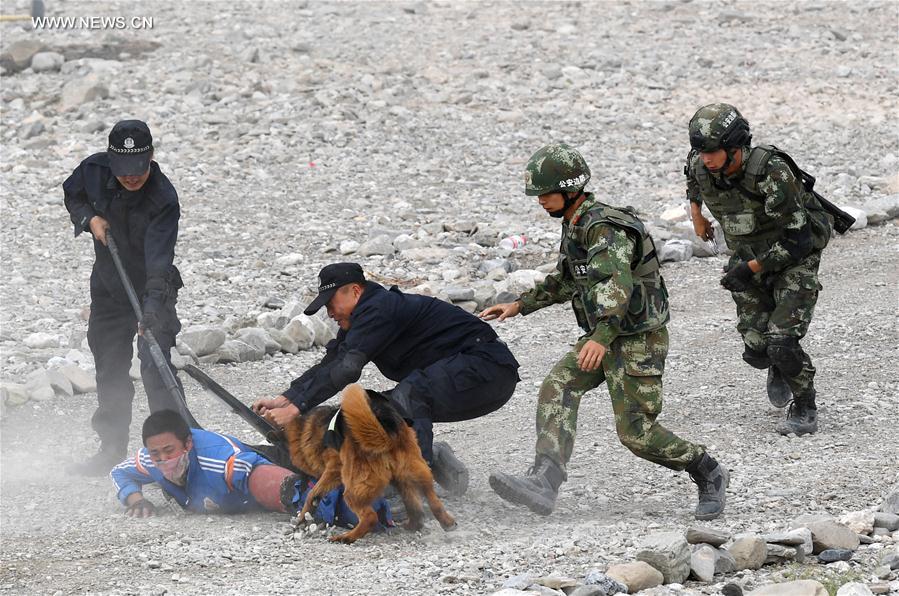Editor's note: Gao Tongtong, a special commentator on current affairs for CGTN, is a research fellow at the Institute for Communication and Borderland Governance of Jinan University. The article reflects the author's opinions and not necessarily the views of CGTN.
June 29, 2024 -- In today's world, the international community faces numerous non-traditional security threats, including terrorist attacks, transnational crime, disease outbreaks and climate change. Terrorism, as a common enemy of all humanity, poses a primary threat to global security. To accelerate international counter-terrorism cooperation, the United Nations Security Council adopted a declaration on global efforts to combat terrorism attached to Resolution 1377 in 2001, followed by the United Nations Global Counter-Terrorism Strategy in 2006. Over time, combating terrorism has gradually become a consensus among nations.
In recent years, despite significant strides in the global fight against terrorism, the spread of terrorism has not been effectively curbed. From the 2019 Sri Lanka Easter bombings to the 2023 Peshawar mosque blast in Pakistan, and the 2024 Moscow concert hall attack in Russia, terrorist activities have intensified in certain countries and regions, showing worrying signs of resurgence. The global counter-terrorism landscape remains complex.
The lack of substantial success in international counter-terrorism efforts can largely be attributed to some countries adopting double standards on the issue, using "counter-terrorism" as a guise for self-interest. As a victim of terrorism, the United States has not only failed to take its due responsibility but has also politicized counter-terrorism, using it as a tool to serve its own interests and ideology. On the one hand, the U.S. criticizes the counter-terrorism actions of its so-called strategic competitors under the pretense of "human rights," abusing "long-arm jurisdiction" to interfere in other countries' internal affairs. On the other hand, to maintain its global hegemony, the U.S. has financially backed certain terrorist organizations, nurturing and exploiting terrorist forces to disrupt the security of other nations.
Take China's Xinjiang Uygur Autonomous Region as an example. In recent times, terrorism has caused significant harm to Xinjiang. Incomplete statistics indicate that from 1990 to the end of 2016, thousands of violent terrorist incidents occurred in Xinjiang, resulting in the deaths of numerous innocent civilians and hundreds of police officers, and incalculable property losses.

File photo shows a "mobster" is controlled during a joint anti-terrorist exercise held by China and Kyrgyzstan frontier forces in Kizilsu Kirgiz Prefecture, northwest China's Xinjiang Uygur Autonomous Region, June 27, 2017. /Xinhua
This year, the Institute for Communication and Borderland Governance of Jinan University released the first and second installments of the "Victims and Survivors of Terrorism in China: An Oral History," highlighting through vivid personal experiences the harm terrorism has inflicted on people of all ethnic groups in Xinjiang. However, the U.S. turns a blind eye to these facts, forcibly linking Xinjiang's counter-terrorism efforts with issues of human rights, ethnicity and religion, continuously tarnishing China's image.
In recent years, the U.S. has raised the banner of "protecting human rights," attacking China's actions in preventing and combating terrorism and stigmatizing the vocational education and training centers lawfully established in Xinjiang. The U.S. has sensationalized topics using words such as "concentration camps" and "genocide," claiming that the Chinese government has detained a million Uygurs. While pushing for the internationalization of Xinjiang-related issues, the U.S., under the pretext of "excessive counter-terrorism," has roped in allies to sanction and pressure China.
Moreover, from 2004 to 2020, the U.S. secretly funneled nearly $8.76 million "black money" in the National Endowment for Democracy to Uygur separatist groups, such as "the East Turkestan Islamic Movement (ETIM)," "the World Uygur Congress" and "the Uygur American Association" to support separatist propaganda activities. Particularly, the decision by former U.S. Secretary of State Mike Pompeo in 2020 to remove the ETIM from its list of terrorist organizations fully exposed the U.S.'s mindset of "fake counter-terrorism, real hegemonism."
Terrorism is a malignancy in human civilization, and combating it is the shared responsibility of the international community. For a long time, the U.S. has wantonly trampled on international law and the fundamental principles of international relations, shielding and indulging terrorist organizations to serve its own interests, which represents the greatest disregard for human rights.
The international fight against terrorism is a long-term endeavor. Nations must abandon the politicization of counter-terrorism, cooperate to combat all forms of terrorism, and jointly maintain global peace and stability.


